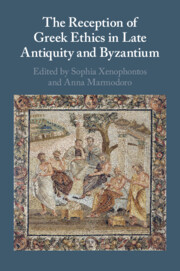Book contents
- The Reception of Greek Ethics in Late Antiquity and Byzantium
- The Reception of Greek Ethics in Late Antiquity and Byzantium
- Copyright page
- Contents
- Tables
- Contributors
- Acknowledgements
- Abbreviations
- Introduction
- Part I Ethics across the Late-antique and Byzantine Period
- Part II Prominent Ethical Views of the Time
- Chapter 9 The Ethos of a Theologian
- Chapter 10 Porphyry on Justice towards Animals
- Chapter 11 Eustratius of Nicaea and the Nicomachean Ethics in Twelfth-century Constantinople: Literary Criticism, Patronage and the Construction of the Byzantine Commentary Tradition
- Chapter 12 Michael of Ephesus on the Relation of Civic Happiness to Happiness in Contemplation
- Chapter 13 George Pachymeres’ Commentary on Aristotle’s Nicomachean Ethics
- Bibliography
- Index Locorum
- Index of Names and Subjects
Chapter 9 - The Ethos of a Theologian
Gregory of Nazianzus and the Reception of Classical Ethics
from Part II - Prominent Ethical Views of the Time
Published online by Cambridge University Press: 15 June 2021
- The Reception of Greek Ethics in Late Antiquity and Byzantium
- The Reception of Greek Ethics in Late Antiquity and Byzantium
- Copyright page
- Contents
- Tables
- Contributors
- Acknowledgements
- Abbreviations
- Introduction
- Part I Ethics across the Late-antique and Byzantine Period
- Part II Prominent Ethical Views of the Time
- Chapter 9 The Ethos of a Theologian
- Chapter 10 Porphyry on Justice towards Animals
- Chapter 11 Eustratius of Nicaea and the Nicomachean Ethics in Twelfth-century Constantinople: Literary Criticism, Patronage and the Construction of the Byzantine Commentary Tradition
- Chapter 12 Michael of Ephesus on the Relation of Civic Happiness to Happiness in Contemplation
- Chapter 13 George Pachymeres’ Commentary on Aristotle’s Nicomachean Ethics
- Bibliography
- Index Locorum
- Index of Names and Subjects
Summary
This chapter explores the reception of classical ethical philosophy in the fourth-century Cappadocian Father, Gregory of Nazianzus, by focusing on the first of his five Theological Orations (Or. 27). An Athenian-trained rhetorician who became the most widely studied and imitated author in Byzantium, Gregory weaves together various strands from ancient ethical discourse in order to set out the moral and cultural prerequisites for performing theology. Gregory’s construction of the ideal theologian reflects late-antique discussions about the proper exegesis of texts, the moral character expected of teachers and students, and the policing of discourse. Finally, Gregory distinguishes the appropriate performance of theology from theology performed simpliciter through a set of qualifications that reflect a recognisably Aristotelian framework, one that can be traced back to the Nicomachean Ethics.
- Type
- Chapter
- Information
- The Reception of Greek Ethics in Late Antiquity and Byzantium , pp. 161 - 173Publisher: Cambridge University PressPrint publication year: 2021

